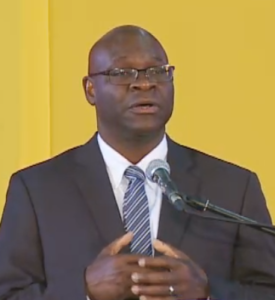A huge challenge facing faith-based groups operating overseas is ignorance about the laws governing religion in other countries.
It can get people into a lot of trouble, said Eron Henry, a Jamaian-born American and former communications executive with the Baptist World Alliance.

Eron Henry
So, Henry has written a newly published book he hopes may prevent embarrassing, if not tragic, situations around the globe.
Constitutionally Religious: What the Constitutions of 180 Countries Say About Religion and Belief, aims to equip people of all faiths with information that can help international work operate more smoothly.
“Constitution matters and religious actors need to take these constitutions seriously,” Henry told Baptist News Global.
It’s all too common to see religious groups travel overseas oblivious not only the values, but to the laws of those countries, he said. Sometimes those cases end up on international news as diplomatic incidents.
“They don’t take it seriously enough when they want to do things in other countries,” he said.
Henry spoke with BNG about the book and the related insights he gained from the global Baptist family through BWA. Here are his comments, edited for clarity.
What motivated you to write on this topic?
In my work with BWA we dealt a lot with issues of religious persecution globally. Faith-based institutions in many parts of the world are a minority and many times they do face persecutions. Many times, we would get reports of laws being passed that could affect religious communities. I always wanted to have a clear understanding of what the constitutions in those countries say, but there was no one source to determine what these countries say about religion. I have always felt this kind of resource is a need.
Who is your intended audience?
I believe this book would be important for any global actors, any religious institutions, who want to be engaged in different countries. No matter if you are Christian, Muslim, Buddhist or Shinto, if you want to be engaged in a country other than your own you should know what that country says about religion and belief.
What are the consequences of failing to do that?
I have had experiences where persons of faith from Western countries go into another country and experience the most embarrassing episodes because they did not inform themselves about what the laws are in that country concerning religious activities.
Any organization engaged in any kind of faith activity, whether it is mission work, evangelism, advocacy, and so on, should be aware of what is going on with the laws of that country.
Are constitutions generally consistent with actual practices in most countries?
There are societies where there are traditional practices at the local level and the village level where the actors violate what the constitution says. I don’t want to name them. I remember a country in central Asia where the traditions of the local people did not share some of the tolerance expressed in the constitution. In countries where the tradition is to have only one religion, but the constitution protects people of all faiths, village leaders may not agree with what the constitution says – if they are even aware of what it says. An example would be when a Christian group wants to plant a church in their village. This would be considered anathema.
What are some of the commonalities you found between different constitutions?
One is that certain countries, especially in Western countries, seem to draw on a common tradition because the wording is consistent. Number two, it seems clear that younger countries, or newer counties, that gained independence in the wake of World War II drew much of their constitutional provisions from certain declarations and treaties coming out of the United Nations, like the Universal Declaration of Human Rights.
Of all of them, which would you most want to live under?
I think for all its shortcomings and its many faults, it would be the United States Constitution. I was shocked how different the U.S. Constitution is from almost every other constitution. It is one of the vaguest. It is an animal all by itself. After reading all these others, I see why Americans make such a fuss about theirs. It leaves room open for debate and discussion, whereas so many others are restrictive.


